Latest Sheet Music
Carrie Underwood
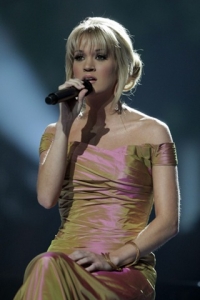
Carrie Marie Underwood (born March 10, 1983 in Muskogee, Oklahoma) is an American country singer-songwriter. She rose to fame as the winner of the fourth season of American Idol, and has become a multi-platinum selling recording artist and a multiple Grammy Award winner. Her debut album, Some Hearts, was certified seven times platinum and is the fastest selling debut country album in Nielsen SoundScan history.
Her second album, Carnival Ride, was released on October 23, 2007. It has so far sold about 2 million copies To date, Underwood has sold over 11 million records in the United States. Underwood was inducted as a member of the Grand Ole Opry on May 10, 2008.
Her second album, Carnival Ride, was released on October 23, 2007. It has so far sold about 2 million copies To date, Underwood has sold over 11 million records in the United States. Underwood was inducted as a member of the Grand Ole Opry on May 10, 2008.
Harry Potter and the Prisoner of Azkaban
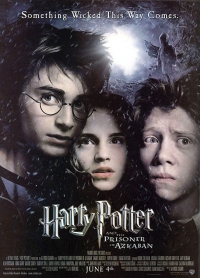
Harry Potter and the Prisoner of Azkaban is a 2004 fantasy adventure film, based on the novel of the same name by J. K. Rowling. Directed by Alfonso Cuarón, it is the third film in the popular Harry Potter series. It stars Daniel Radcliffe as the teenage wizard Harry Potter, and Rupert Grint and Emma Watson as Harry's best friends Ron Weasley and Hermione Granger. Gary Oldman and David Thewlis joined the cast as the new characters Sirius Black and Remus Lupin. In this movie, the role of Albus Dumbledore was played by Michael Gambon who took over from the late Richard Harris who died of Hodgkin's disease. Steve Kloves returned as screenwriter, while Chris Columbus (the director of the previous two films) became a producer, alongside David Heyman. The film was released on 31 May 2004 in the United Kingdom and on 4 June 2004 in the United States as the first film released into IMAX theaters.
The film was nominated for two Academy Awards — Academy Award for Original Music Score and Academy Award for Visual Effects at the 77th Academy Awards held in 2005.
The film was nominated for two Academy Awards — Academy Award for Original Music Score and Academy Award for Visual Effects at the 77th Academy Awards held in 2005.
Peanuts

Peanuts is a syndicated daily and Sunday American comic strip written and illustrated by Charles M. Schulz, which ran from October 2, 1950, to February 13, 2000, continuing in reruns afterward. The strip is the most popular and influential in the history of the comic strip, with 17,897 strips published in all, Reprints of the strip are still syndicated and run in almost every U.S. newspaper.
Peanuts achieved extreme success for its television specials, several of which, including A Charlie Brown Christmas won or were nominated for Emmy Awards. The holiday specials remain quite popular and are currently broadcast on ABC in the United States during the corresponding season. The property is also a landmark in theatre with the stage musical You're a Good Man, Charlie Brown being an extremely successful and often-performed production.
Peanuts achieved extreme success for its television specials, several of which, including A Charlie Brown Christmas won or were nominated for Emmy Awards. The holiday specials remain quite popular and are currently broadcast on ABC in the United States during the corresponding season. The property is also a landmark in theatre with the stage musical You're a Good Man, Charlie Brown being an extremely successful and often-performed production.
Michael Buble

Michael Steven Bublé (born 9 September 1975) is a Canadian big band singer. He won several awards, including a Grammy and multiple Juno Awards. While achieving modest chart success in the United States, his 2003 self-titled album has reached the top ten in Lebanon, the UK and his home country. However, he did find commercial success in the U.S. with his 2005 album It's Time. He has sold over 18 million albums. Michael has also appeared on the TV series Rove four times.
The album Michael Bublé was released by Warner Bros. Records just before Valentine's Day in 2003. The album was actually first released by the Warner company in South Africa, where the album went into the Top 5 and was certified Gold. Soon after that, it entered the Canadian album charts. As success in the USA was marginal at best, Bublé started visiting countries all over the world, with the album being successful in places like the Philippines and Singapore. He then moved on to placed like Italy and eventually had chart success in the UK, U.S., Australia and elsewhere soon followed with the album going Platinum and reaching the top ten of the album charts in the UK and Canada and going all the way to #1 in Australia. The album has reached the top 50 of the Billboard 200 album charts in the U.S. His version of George Michael's "Kissing a Fool" was released as a single from the album and reached the top 30 of the Billboard Hot Adult Contemporary Tracks chart. "How Can You Mend a Broken Heart?" reached the top 30 of the Billboard Adult Contemporary chart as well. His third single "Sway" also reached the top 30 of the Adult Contemporary chart, while a Junkie XL remix of the song reached the top 20 in Australia in May 2004.
Bublé's second studio album, It's Time, debuted as a hugely successful performance. The album reached number 7 on the Billboard 200 album chart and number 2 on the ARIA Album Charts in Australia. It's Time also debuted at number 4 on the UK Album Charts. The album features covers of Beatles and Ray Charles songs, and the hit single "Home".
The album Michael Bublé was released by Warner Bros. Records just before Valentine's Day in 2003. The album was actually first released by the Warner company in South Africa, where the album went into the Top 5 and was certified Gold. Soon after that, it entered the Canadian album charts. As success in the USA was marginal at best, Bublé started visiting countries all over the world, with the album being successful in places like the Philippines and Singapore. He then moved on to placed like Italy and eventually had chart success in the UK, U.S., Australia and elsewhere soon followed with the album going Platinum and reaching the top ten of the album charts in the UK and Canada and going all the way to #1 in Australia. The album has reached the top 50 of the Billboard 200 album charts in the U.S. His version of George Michael's "Kissing a Fool" was released as a single from the album and reached the top 30 of the Billboard Hot Adult Contemporary Tracks chart. "How Can You Mend a Broken Heart?" reached the top 30 of the Billboard Adult Contemporary chart as well. His third single "Sway" also reached the top 30 of the Adult Contemporary chart, while a Junkie XL remix of the song reached the top 20 in Australia in May 2004.
Bublé's second studio album, It's Time, debuted as a hugely successful performance. The album reached number 7 on the Billboard 200 album chart and number 2 on the ARIA Album Charts in Australia. It's Time also debuted at number 4 on the UK Album Charts. The album features covers of Beatles and Ray Charles songs, and the hit single "Home".
South Pacific

South Pacific is a 1958 American romantic musical film based on the 1949 Rodgers and Hammerstein musical South Pacific, which in turn is loosely based on James A. Michener's 1947 short-story collection Tales of the South Pacific. The film, directed by Joshua Logan, stars Rossano Brazzi, Mitzi Gaynor, John Kerr and Ray Walston in the leading roles with Juanita Hall as Bloody Mary, the part that she had played in the original stage production. The film was nominated for three Academy Awards, winning the Academy Award for Best Sound for Fred Hynes.
Amedeo Tommasi

Amedeo Tommasi (1 December 1935 – 13 April 2021) was an Italian pianist and composer. He specialized in the composition of music for films.Tommasi started his career as a trombonist for a jazz band in Bologna. He gained notoriety in Italy for his performances on the radio show La coppa di jazz in 1960. The following year, he performed in the Sanremo Music Festival and received the First Prize at the Festival Bled in Slovenia. In the years following, he made recordings with Chet Baker, Bobby Jaspar, René Thomas, Buddy Collette, Conte Candoli, and Jacques Pelzer. In the early 1970s, he began composing music for films. In the film The Legend of 1900, he composed each of the recordings and also had a cameo appearance as a pianist. He also appeared in the 2010 documentary Pupi Avati, ieri oggi domani, directed by Claudio Costa.
Sarah McLachlan

Sarah Ann McLachlan, OC, OBC (born January 28, 1968) is a Grammy-winning Canadian musician, singer and songwriter.
She is known for the emotional sound of her ballads. Some of her most popular songs include "Angel", "Building a Mystery", "Adia", "Possession", "Fallen", "I Will Remember You", and "World on Fire". As of 2006, she has sold over 40 million albums worldwide. Her best-selling album to date is Surfacing, for which she won eight Juno Awards and three Grammy Awards. In addition to her personal artistic efforts, she founded the Lilith Fair tour, which showcased female musicians in the late 1990s.
Her 1991 album, Solace, was her mainstream breakthrough in Canada, spawning the hit singles "The Path of Thorns (Terms)" and "Into the Fire". Solace also marked the beginning of her partnership with Pierre Marchand. Marchand and McLachlan have been collaborators ever since, with Marchand producing all of McLachlan's albums and occasionally co-writing songs.
1994's Fumbling Towards Ecstasy was an immediate smash hit in Canada. From her Nettwerk connection, her piano version of the song "Possession" was included on the first Due South soundtrack in 1996. Over the next two years, Fumbling Towards Ecstasy quietly became McLachlan's international breakthrough as well, scaling the charts in a number of countries.
Following the success from Fumbling Towards Ecstasy, McLachlan returned in 1997 with Surfacing, her best selling album to date. Earning her two Grammy awards and four Junos, the album has since sold over 11 million copies worldwide and brought her much international success
She is known for the emotional sound of her ballads. Some of her most popular songs include "Angel", "Building a Mystery", "Adia", "Possession", "Fallen", "I Will Remember You", and "World on Fire". As of 2006, she has sold over 40 million albums worldwide. Her best-selling album to date is Surfacing, for which she won eight Juno Awards and three Grammy Awards. In addition to her personal artistic efforts, she founded the Lilith Fair tour, which showcased female musicians in the late 1990s.
Her 1991 album, Solace, was her mainstream breakthrough in Canada, spawning the hit singles "The Path of Thorns (Terms)" and "Into the Fire". Solace also marked the beginning of her partnership with Pierre Marchand. Marchand and McLachlan have been collaborators ever since, with Marchand producing all of McLachlan's albums and occasionally co-writing songs.
1994's Fumbling Towards Ecstasy was an immediate smash hit in Canada. From her Nettwerk connection, her piano version of the song "Possession" was included on the first Due South soundtrack in 1996. Over the next two years, Fumbling Towards Ecstasy quietly became McLachlan's international breakthrough as well, scaling the charts in a number of countries.
Following the success from Fumbling Towards Ecstasy, McLachlan returned in 1997 with Surfacing, her best selling album to date. Earning her two Grammy awards and four Junos, the album has since sold over 11 million copies worldwide and brought her much international success
Ghost
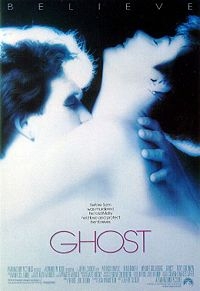
Ghost is a 1990 romantic drama-fantasy-thriller film starring Patrick Swayze, Demi Moore, Tony Goldwyn and Whoopi Goldberg, written by Bruce Joel Rubin and directed by Jerry Zucker. It was nominated for multiple Academy Awards, including Best Picture, winning for Best Original Screenplay, as well as Best Supporting Actress for Whoopi Goldberg.
Victor Carbajo

Compositor y pianista español nacido en Madrid en 1970. Cursó estudios musicales en el Real Conservatorio Superior de Música de su ciudad natal, donde se graduó como Profesor Superior de Armonía, Contrapunto, Composición e Instrumentación, con el Premio Fin de Carrera de Composición en 1993.
Within Temptation

Within Temptation is a Dutch rock/metal band. The band was founded in 1996 by vocalist Sharon den Adel and guitarist Robert Westerholt. Their music is described as symphonic metal, gothic metal, although in an interview, Den Adel said they fell into a symphonic rock genre with various influences, and in a later interview with 3VOOR12, Sharon stated that "we consider ourselves more a symphonic rock band ... we are in my opinion no gothic band".
After the release of their first album Enter, the band became prominent in the underground scene. However it was not until 2001 that they became known to the general public, with the single "Ice Queen" from the album Mother Earth, which reached #2 on the charts. Since then, the band won the Conamus Exportprijs five years in a row. Their next album The Silent Force debuted at #1 on the Dutch charts, as did their latest, The Heart of Everything. In 2008 they released a live DVD and CD, Black Symphony, recorded with the Metropole Orchestra.
On August 11, 2009 Within Temptation announced that they would be releasing a live album consisting of acoustic sets from their theatre tour, entitled An Acoustic Night At The Theatre, which was released on October 30th.
After the release of their first album Enter, the band became prominent in the underground scene. However it was not until 2001 that they became known to the general public, with the single "Ice Queen" from the album Mother Earth, which reached #2 on the charts. Since then, the band won the Conamus Exportprijs five years in a row. Their next album The Silent Force debuted at #1 on the Dutch charts, as did their latest, The Heart of Everything. In 2008 they released a live DVD and CD, Black Symphony, recorded with the Metropole Orchestra.
On August 11, 2009 Within Temptation announced that they would be releasing a live album consisting of acoustic sets from their theatre tour, entitled An Acoustic Night At The Theatre, which was released on October 30th.
David Archuleta

David James Archuleta (born December 28, 1990) is an American singer. In May 2008, he became the runner-up on the seventh season of American Idol receiving 44 percent of over 97 million votes. Archuleta's first single "Crush" was released in August 2008; his self-titled debut album was released in November 2008.
Archuleta's mother is from Honduras, and much of the music he listened to as a child was Latin-influenced including watching his mom sing at events with her sisters. She also "was big on dancing" according to Archuleta, and would "make" him dance to traditional music with his older sister. He also listened to jazz music, he said, from his father's collection as well as gospel, pop, rock and "soulful music." In a later interview, he revealed that his father was a jazz musician. Archuleta also said he enjoys Broadway musicals.
On his American Idol "Fast Facts" page, Archuleta cited his musical influences as Natalie Cole, Stevie Wonder, Kirk Franklin and Bryan Adams. When he listed his top pop music artists, he cited Natasha Bedingfield, Natalie Cole, Celine Dion, Mariah Carey, Michael Jackson, Stevie Wonder, Bryan Adams, Kirk Franklin, and Robbie Williams. Like Elliott Yamin and another singer he admires, John Mayer, Archuleta tries to infuse his pop selections with a soulful vibe. In a Seventeen interview he cites Sara Bareilles as a clever singer-songwriter he looks up to.
Archuleta's mother is from Honduras, and much of the music he listened to as a child was Latin-influenced including watching his mom sing at events with her sisters. She also "was big on dancing" according to Archuleta, and would "make" him dance to traditional music with his older sister. He also listened to jazz music, he said, from his father's collection as well as gospel, pop, rock and "soulful music." In a later interview, he revealed that his father was a jazz musician. Archuleta also said he enjoys Broadway musicals.
On his American Idol "Fast Facts" page, Archuleta cited his musical influences as Natalie Cole, Stevie Wonder, Kirk Franklin and Bryan Adams. When he listed his top pop music artists, he cited Natasha Bedingfield, Natalie Cole, Celine Dion, Mariah Carey, Michael Jackson, Stevie Wonder, Bryan Adams, Kirk Franklin, and Robbie Williams. Like Elliott Yamin and another singer he admires, John Mayer, Archuleta tries to infuse his pop selections with a soulful vibe. In a Seventeen interview he cites Sara Bareilles as a clever singer-songwriter he looks up to.
Jesus: The Epic Mini-Series
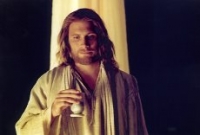
This television mini-series, which aired on CBS in May 2000, looks at the life of Jesus from His humble beginnings as a carpenter through His extraordinary life and the mission of His spiritual destiny.
This is a superb production and should prove very helpful to stimulate interest on the part of a Biblically illiterate generation to want to know more about the Gospels and the extraordinary life, death, resurrection and meaning of Jesus.
With a $24 million budget, Jesus was shot on location in Morocco and Malta. This four-hour global television event features an all-star cast including Jeremy Sisto, Gary Oldman, Armin Mueller-Stall, Jacqueline Bisset, Debra Messing, and David O'Hara. It also includes the music of Leann Rimes, Steven Curtis Chapman, Avalon, Jaci Velasquez, DC Talk, Yolanda Adams, Patrick Williams, 98 Degrees, Hootie and the Blowfish, Sarah Brightman, Lonestar, and Edwin McCain.
This is a superb production and should prove very helpful to stimulate interest on the part of a Biblically illiterate generation to want to know more about the Gospels and the extraordinary life, death, resurrection and meaning of Jesus.
With a $24 million budget, Jesus was shot on location in Morocco and Malta. This four-hour global television event features an all-star cast including Jeremy Sisto, Gary Oldman, Armin Mueller-Stall, Jacqueline Bisset, Debra Messing, and David O'Hara. It also includes the music of Leann Rimes, Steven Curtis Chapman, Avalon, Jaci Velasquez, DC Talk, Yolanda Adams, Patrick Williams, 98 Degrees, Hootie and the Blowfish, Sarah Brightman, Lonestar, and Edwin McCain.
Rent

Rent is a rock musical, with music and lyrics by Jonathan Larson based on Giacomo Puccini's opera La Bohème. It tells the story of a group of impoverished young artists and musicians struggling to survive and create in New York's Lower East Side in the thriving days of the Bohemian East Village, under the shadow of AIDS.
Rent won a Tony Award for Best Musical and a Pulitzer Prize, among other awards. In addition, its cast was unusually ethnically diverse. Rent brought controversial topics to a traditionally conservative medium, and it helped to increase the popularity of musical theater amongst the younger generation. "Rent speaks to Generation X the way that the musical Hair spoke to the baby boomers or those who grew up in the 1960s, calling it "a rock opera for our time, a Hair for the 90s."
The musical was first seen at the New York Theatre Workshop in 1994. On January 26, 1996, Rent opened in New York City off-Broadway before moving to Broadway's Nederlander Theatre on April 29, 1996. Rent has been successful on Broadway, where it had critical acclaim and word-of-mouth popularity. The Broadway production of Rent closed on September 7, 2008 after a 12 year run and 5,124 performances, making it the seventh-longest-running Broadway show. The production has grossed over $280 million. At the time of its closing, it was the second-longest-running musical currently on Broadway, eight years behind The Phantom of the Opera.
Rent won a Tony Award for Best Musical and a Pulitzer Prize, among other awards. In addition, its cast was unusually ethnically diverse. Rent brought controversial topics to a traditionally conservative medium, and it helped to increase the popularity of musical theater amongst the younger generation. "Rent speaks to Generation X the way that the musical Hair spoke to the baby boomers or those who grew up in the 1960s, calling it "a rock opera for our time, a Hair for the 90s."
The musical was first seen at the New York Theatre Workshop in 1994. On January 26, 1996, Rent opened in New York City off-Broadway before moving to Broadway's Nederlander Theatre on April 29, 1996. Rent has been successful on Broadway, where it had critical acclaim and word-of-mouth popularity. The Broadway production of Rent closed on September 7, 2008 after a 12 year run and 5,124 performances, making it the seventh-longest-running Broadway show. The production has grossed over $280 million. At the time of its closing, it was the second-longest-running musical currently on Broadway, eight years behind The Phantom of the Opera.
The Incredible Hulk
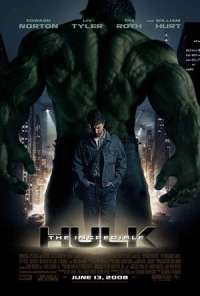
The Incredible Hulk is a 2008 superhero film based on the Marvel Comics character the Hulk. It is directed by Louis Leterrier and stars Edward Norton as Dr. Bruce Banner/the Hulk. It is not a sequel to Hulk (2003), but rather a reboot that establishes a new back-story where Banner became the Hulk as an unwitting pawn in a military scheme to reinvigorate the supersoldier program through gamma radiation. On the run, he attempts to cure himself of the Hulk before he is captured by General Thaddeus "Thunderbolt" Ross (William Hurt), but his worst fears are realized when power-hungry soldier Emil Blonsky (Tim Roth) becomes the Abomination. Liv Tyler also stars as Betty Ross, Banner's girlfriend and General Ross's daughter.
Marvel Studios reacquired the rights to the character after the mixed reception to Hulk, and writer Zak Penn began work on a loose sequel that would be much closer to the comics and the television series. Norton rewrote the script after he signed on to star, which clarified the film's new back-story. Leterrier aimed to make the film realistic, giving a more frightening direction for the look of the monsters, while redesigning the Abomination from the comics' reptilian humanoid into a mutated monster with bony protrusions. Filming mostly took place in Toronto, Canada in 2007, where the production attempted to be environmentally friendly.
The film outgrossed its predecessor and received generally positive reviews. Despite this positive reception Marvel chose to put off a possible sequel until after 2012's The Avengers. As of April 6, 2009, the film has grossed $263,427,551 in worldwide box office and it made $85,755,879 in home video sales, bringing its total film gross to $349,183,430.
Marvel Studios reacquired the rights to the character after the mixed reception to Hulk, and writer Zak Penn began work on a loose sequel that would be much closer to the comics and the television series. Norton rewrote the script after he signed on to star, which clarified the film's new back-story. Leterrier aimed to make the film realistic, giving a more frightening direction for the look of the monsters, while redesigning the Abomination from the comics' reptilian humanoid into a mutated monster with bony protrusions. Filming mostly took place in Toronto, Canada in 2007, where the production attempted to be environmentally friendly.
The film outgrossed its predecessor and received generally positive reviews. Despite this positive reception Marvel chose to put off a possible sequel until after 2012's The Avengers. As of April 6, 2009, the film has grossed $263,427,551 in worldwide box office and it made $85,755,879 in home video sales, bringing its total film gross to $349,183,430.
Gluck

Christoph Willibald Ritter von Gluck (born 2 July 1714 Erasbach, Upper Palatinate; died 15 November 1787 in Vienna) was a composer of the 18th century, most noted for his operatic works. After many years at the Habsburg court at Vienna, Gluck brought about the practical reform of opera's dramaturgical practices that many intellectuals had been campaigning for over the years. With a series of radical new works in the 1760s, among them Orfeo ed Euridice and Alceste, he broke the stranglehold that Metastasian opera seria had enjoyed for much of the century.
The strong influence of French opera in these works encouraged Gluck to move to Paris, which he did in November 1773. Fusing the traditions of Italian opera and the French national genre into a new synthesis, Gluck wrote eight operas for the Parisian stages. One of the last of these, Iphigénie en Tauride, was a great success and is generally acknowledged to be his finest work. Though extremely popular and widely credited with bringing about a revolution in French opera, Gluck's mastery of the Parisian operatic scene was never absolute, and after the poor reception of his Echo et Narcisse, he left Paris in disgust and returned to Vienna to live out the remainder of his life.
The strong influence of French opera in these works encouraged Gluck to move to Paris, which he did in November 1773. Fusing the traditions of Italian opera and the French national genre into a new synthesis, Gluck wrote eight operas for the Parisian stages. One of the last of these, Iphigénie en Tauride, was a great success and is generally acknowledged to be his finest work. Though extremely popular and widely credited with bringing about a revolution in French opera, Gluck's mastery of the Parisian operatic scene was never absolute, and after the poor reception of his Echo et Narcisse, he left Paris in disgust and returned to Vienna to live out the remainder of his life.
Badarzewska
Tekla Bądarzewska-Baranowska was a Polish composer. Bądarzewska was born in 1829 in Mława or 1834 in Warsaw. She married Jan Baranowski and they had five children in their nine years of marriage. Bądarzewska-Baranowska died on 29 September 1861 in Warsaw
Dukas

Paul Abraham Dukas (1 October 1865 – 17 May 1935) was a French composer, critic, scholar and teacher. A studious man, of retiring personality, he was intensely self-critical, and he abandoned and destroyed many of his compositions. His best known work is the orchestral piece The Sorcerer's Apprentice (L'apprenti sorcier), the fame of which has eclipsed that of his other surviving works. Among these are an opera Ariane et Barbe-bleue, a symphony, two substantial works for solo piano, and a ballet, La Péri.
At a time when French musicians were divided into conservative and progressive factions, Dukas adhered to neither but retained the admiration of both. His compositions were influenced by composers including Beethoven, Berlioz, Franck, d'Indy and Debussy.
In tandem with his composing career, Dukas worked as a music critic, contributing regular reviews to at least five French journals. Later in his life he was appointed professor of composition at the Conservatoire de Paris and the École Normale de Musique; his pupils included Maurice Duruflé, Olivier Messiaen, Manuel Ponce, and Joaquín Rodrigo.
At a time when French musicians were divided into conservative and progressive factions, Dukas adhered to neither but retained the admiration of both. His compositions were influenced by composers including Beethoven, Berlioz, Franck, d'Indy and Debussy.
In tandem with his composing career, Dukas worked as a music critic, contributing regular reviews to at least five French journals. Later in his life he was appointed professor of composition at the Conservatoire de Paris and the École Normale de Musique; his pupils included Maurice Duruflé, Olivier Messiaen, Manuel Ponce, and Joaquín Rodrigo.
Beethoven

Ludwig van Beethoven (16 December 1770 - 26 March 1827) was a German composer and pianist. He was a crucial figure in the transitional period between the Classical and Romantic eras in Western classical music, and remains one of the most respected and influential composers of all time.
Born in Bonn, then in the Electorate of Cologne (now in modern-day Germany), he moved to Vienna in his early twenties and settled there, studying with Joseph Haydn and quickly gaining a reputation as a virtuoso pianist. Beethoven's hearing gradually deteriorated beginning in his twenties, yet he continued to compose masterpieces, and to conduct and perform, even after he was completely deaf.
Born in Bonn, then in the Electorate of Cologne (now in modern-day Germany), he moved to Vienna in his early twenties and settled there, studying with Joseph Haydn and quickly gaining a reputation as a virtuoso pianist. Beethoven's hearing gradually deteriorated beginning in his twenties, yet he continued to compose masterpieces, and to conduct and perform, even after he was completely deaf.
Rossini

Gioachino Antonio Rossini (February 29, 1792 – November 13, 1868) was a popular Italian composer who created 39 operas as well as sacred music and chamber music. His best known works include Il barbiere di Siviglia (The Barber of Seville), La Cenerentola and Guillaume Tell (William Tell).
Rossini's most famous opera was produced on February 20, 1816 at the Teatro Argentina in Rome. The libretto by Cesare Sterbini, a version of Pierre Beaumarchais' infamous stage play Le Barbier de Séville, was the same as that already used by Giovanni Paisiello in his own Barbiere, an opera which had enjoyed European popularity for more than a quarter of a century. Much is made of how fast Rossini's opera was written, scholarship generally agreeing upon two weeks. Later in life, Rossini claimed to have written the opera in only twelve days. It was a colossal failure when it premiered as Almaviva; Paisiello’s admirers were extremely indignant, sabotaging the production by whistling and shouting during the entire first act. However, not long after the second performance, the opera became so successful that the fame of Paisiello's opera was transferred to Rossini's, to which the title The Barber of Seville passed as an inalienable heritage.
Rossini's most famous opera was produced on February 20, 1816 at the Teatro Argentina in Rome. The libretto by Cesare Sterbini, a version of Pierre Beaumarchais' infamous stage play Le Barbier de Séville, was the same as that already used by Giovanni Paisiello in his own Barbiere, an opera which had enjoyed European popularity for more than a quarter of a century. Much is made of how fast Rossini's opera was written, scholarship generally agreeing upon two weeks. Later in life, Rossini claimed to have written the opera in only twelve days. It was a colossal failure when it premiered as Almaviva; Paisiello’s admirers were extremely indignant, sabotaging the production by whistling and shouting during the entire first act. However, not long after the second performance, the opera became so successful that the fame of Paisiello's opera was transferred to Rossini's, to which the title The Barber of Seville passed as an inalienable heritage.
 Sheet Music Exchange is a web site for those who wants to access popular sheet music easily,
letting them download the sheet music for free for trial purposes.
It's completely free to download and try the listed sheet music, but you have to delete the files after 24 hours of trial period.
Don't forget, if you like the piece of music you have just learned playing,
treat the artist with respect, and go buy the original sheet music.
Sheet Music Exchange is a web site for those who wants to access popular sheet music easily,
letting them download the sheet music for free for trial purposes.
It's completely free to download and try the listed sheet music, but you have to delete the files after 24 hours of trial period.
Don't forget, if you like the piece of music you have just learned playing,
treat the artist with respect, and go buy the original sheet music.